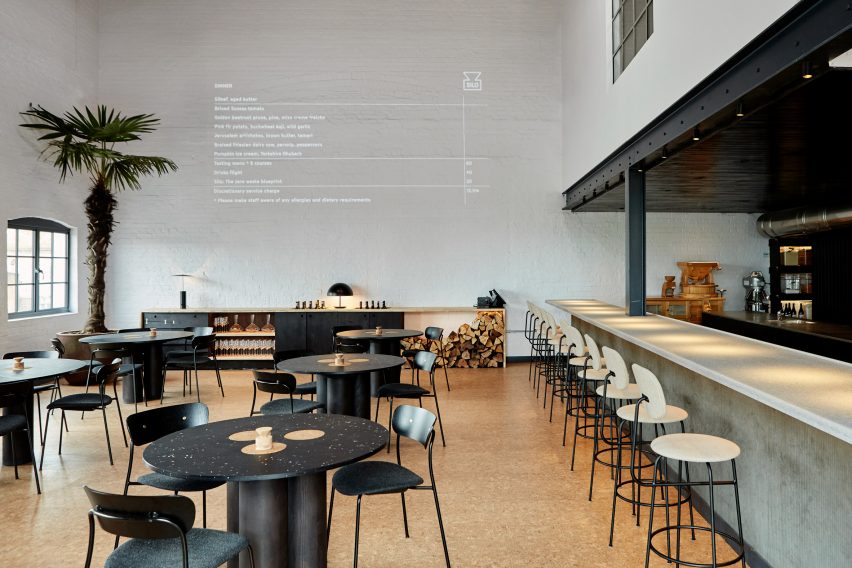Sustainable meals and furnishings options in zero-waste London restaurant Silo
Mycelium pendant lamps dangle above recycled-plastic eating tables inside Silo, a zero-waste restaurant in east London designed by studio Nina+Co.
Silo is ready inside The White Constructing, a inventive hub within the Hackney Wick neighbourhood that accommodates studio area for artists and a craft brewery.
The restaurant, which is headed up by chef Douglas McMaster, units out to create zero waste and shut the loop on meals manufacturing processes.


Workers attempt to take advantage of out of all cooking elements – for instance, “wonky” fruit and greens are blended into smoothies.
Meat can be ready with a nose-to-tail method – the place cooks utilise each a part of the animal, together with offal, as an alternative of simply widespread cuts similar to shank or breast.
A few of the produce, like butter and oat milk, is made in-house.


All produce delivered to the restaurant is available in reusable containers, crates or pails, after which served on plates made out of recycled plastic luggage.
Any meals that is not ultimately consumed is fed into an on-site composting machine.


Design studio Nina+Co was introduced on board to develop interiors that mirrored the restaurant’s sustainability-focused ethos.
“On the studio, we all know that consolation, type and luxurious are completely achievable inside a sustainable framework,” mentioned the studio’s founder, Nina Woodcroft.
“By making use of round considering, utilising sustainable supplies and contemplating how they may both biodegrade or be disassembled for repurposing sooner or later, we created a considerate inside that lives as much as the magnificence and integrity of the meals.”


The white-painted eating room is anchored by an enormous fluted bar counter crafted from recycled plastic packaging.
Straight in entrance is a row of cream stool seats the place visitors can sit and watch dishes being put collectively within the open kitchen, which is lined with blackened timber beams.


Recycled plastic has additionally been used to create the flecked tops of the eating tables. They’re supported by cylindrical legs made out of sustainably-sourced ash wooden and have cork detailing.
Glass wine bottles drunk throughout earlier dinner providers have been crushed, moulded and kiln-fired by a neighborhood potter to create the restaurant’s wall lights – every one contains a trio of round dishes, on the centre of which is an uncovered bulb.


Mycelium, which is the vegetative a part of fungi, has been used to create the pendant lamps, tables and seating poufs within the informal lounge space, the place visitors can take pleasure in cocktails.
“The tables and stools are robust and light-weight, with a delicate pores and skin akin to nubuck leather-based and a resemblance to honed travertine stone,” defined Woodcroft. She instructed Dezeen she’d tried to include extra uncommon sustainable supplies.


Overtreders W creates zero-waste barn and restaurant for Dutch competition
“A few of the revolutionary supplies we hoped to include, like potato waste bio-plastic, pine-needle fibreboard and seaweed materials are usually not but prepared for a industrial setting,” she continued.
“Nonetheless, if a small pioneering restaurant like Silo can obtain what we achieved, I hope and anticipate the hospitality trade as an entire to step-up their recreation and apply their substantial collective spend to those areas.”


Zero-waste eating places are regularly rising in recognition because the meals trade turns into extra environmentally aware.
Two years in the past, Overtreders W erected a short lived zero-waste restaurant at Lowlands Pageant within the Netherlands. Recycled plastic was used to make the venue’s benches and trestle tables, whereas massive sacks of grain have been used as ballast.
Bread baked from potato peelings and pesto made out of kitchen leftovers was on the menu.
The 2018 version of Manhattan-based truthful WantedDesign additionally had a pop-up eatery referred to as Zero Waste Bistro. Surfaces and fixtures have been made out of recycled Tetra Pak – a packaging materials sometimes used for milk cartons.
Images is by Sam A Harris.